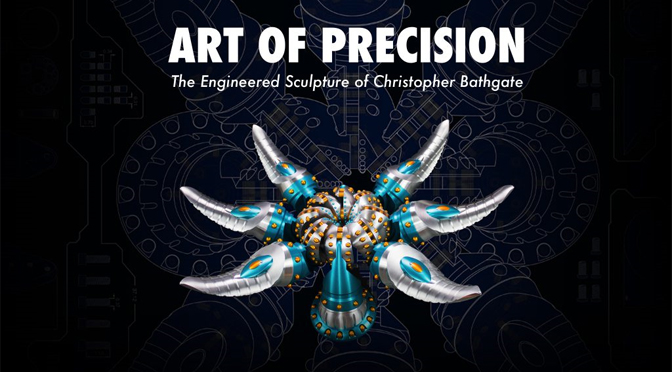|
|
BETHLEHEM, Pa. – Due to the museum’s closure in light of the COVID-19 coronavirus pandemic, the National Museum of Industrial History (NMIH) has announced it will extend its popular exhibit, Art of Precision: The Engineered Sculpture of Christopher Bathgate, through Sunday, August 30th.
“While it was unfortunate that Chris’s exhibit was dark for a bulk of its duration, we’re incredibly happy that we’re able to display his work for longer and bring his fascinating art to more patrons,” said Glenn Koehler, Director of Marketing and PR for NMIH.
The exhibit encompasses the selected works of Christopher Bathgate, a self-trained machinist employing handmade tools, automated CNC milling machines and metal lathes to create complex artistic expressions inspired by industry. Playing with the tension between aesthetic vs. utility, form vs. function, and industrial vs. handmade, Bathgate’s inter-disciplinary work lies at the intersection of art, craft, and design. These pieces serve as an example of how computer-mediated fabrication may bridge the divide between art, craft, and industrial production in the Digital Age.
Featuring over 20 of his sculptures, the exhibit provides a new context of the intersection of art and industry. “Artists have a long history of adopting obsolete processes and equipment for use as creative mediums. Artists have been instrumental in preserving first-hand knowledge of many different crafts going back centuries.” said Mr. Bathgate. “Exhibiting a collection of machined metal sculptures in a museum with such a wonderful collection of antique machines is an excellent way to highlight the relationship that the creative arts have always had with industry.”
The museum is now reopened, with modified hours and increased safety measures. Sanitizing stations have been implemented throughout the museum, touchless soap dispensers have been installed in the museum’s bathrooms, signage has been placed throughout the space to ensure proper social distancing between visitors, and frequently touched areas, such as the museum’s interactive experiences, have been modified or removed. A Plexiglas barrier has been mounted at the museum’s front desk and all staff and visitors over the age of 4 are required to wear masks while inside the museum facilities.
The museum will be open 11 a.m. to 4 p.m., Friday through Sunday until further notice. In accordance with Pennsylvania guidelines, the museum will operate at a 50% capacity until further notice and utilize a timed ticketing system, to allow for controlled entry to the museum with minimal person-to-person interaction. Tickets for the museum can be purchased on the museum’s website at nmih.org
.
About NMIH
A Smithsonian Institution-affiliate, the National Museum of Industrial History is dedicated to preserving America’s rich industrial heritage. Housed in an 18,000-square-foot, 100-year-old former Bethlehem Steel facility on the largest private brownfield in America, the Museum is home to exciting exhibits, engaging programs and amazing history. Learn more at nmih.org
A Smithsonian Institution-affiliate, the National Museum of Industrial History is dedicated to preserving America’s rich industrial heritage. Housed in an 18,000-square-foot, 100-year-old former Bethlehem Steel facility on the largest private brownfield in America, the Museum is home to exciting exhibits, engaging programs and amazing history. Learn more at nmih.org
About Sculptor Chris Bathgate
Baltimore-based artist Chris Bathgate is a self-trained machinist. He utilizes handmade tools and automated CNC (computer numerical control) milling and drilling machines to create precisely-crafted elements that assemble into complex sculptures. Machining is his method of artistic expression. He has spent more than fifteen years adapting metalworking machinery from salvaged and repurposed equipment. Bathgate’s aesthetic considerations stem from the very machines that he uses to create his sculptures. Each piece that he makes is informed by the one it is preceded by, and he modifies his machinery accordingly—not for improved practical function but for the aesthetic developments that can be produced. More about his work and process can be found at chrisbathgate.com
Baltimore-based artist Chris Bathgate is a self-trained machinist. He utilizes handmade tools and automated CNC (computer numerical control) milling and drilling machines to create precisely-crafted elements that assemble into complex sculptures. Machining is his method of artistic expression. He has spent more than fifteen years adapting metalworking machinery from salvaged and repurposed equipment. Bathgate’s aesthetic considerations stem from the very machines that he uses to create his sculptures. Each piece that he makes is informed by the one it is preceded by, and he modifies his machinery accordingly—not for improved practical function but for the aesthetic developments that can be produced. More about his work and process can be found at chrisbathgate.com
Information provided to TVL by:
Glenn Koehler
Director of Marketing and Public Relations
National Museum of Industrial History








